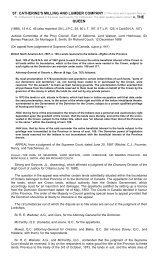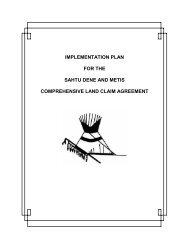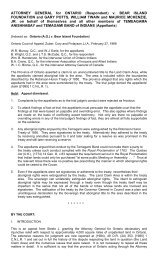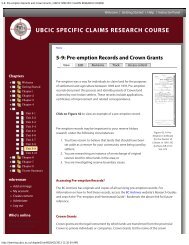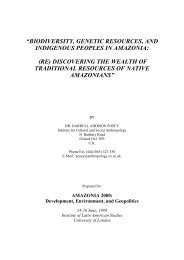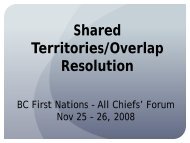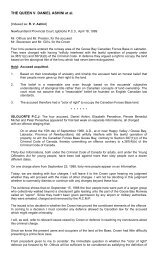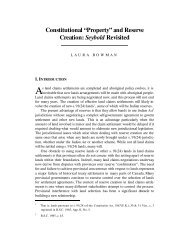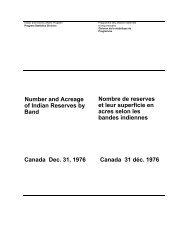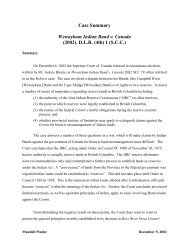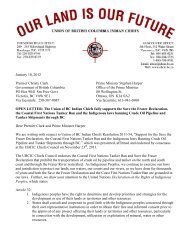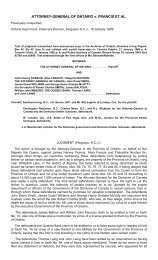HUNT V. HALCAN LOG SERVICES LTD.; RALCAN LOG SERVICES ...
HUNT V. HALCAN LOG SERVICES LTD.; RALCAN LOG SERVICES ...
HUNT V. HALCAN LOG SERVICES LTD.; RALCAN LOG SERVICES ...
Create successful ePaper yourself
Turn your PDF publications into a flip-book with our unique Google optimized e-Paper software.
I cannot accept the plaintiff's argument that the Parliament's intention to extinguish anaboriginal title must be set forth explicitly in the pertinent legislation. I do not agree that Mr.Justice Hall went that far. Once a statute has been validly enacted, it must be given effect. Ifits necessary effect is to abridge or entirely abrogate a common law right, then that is theeffect that the Courts must give it.And he quoted [at p.552 [p.56 C.N.L.R.]] from the judgment of Mr. Justice Judson in the Calder v.A.G.B.C. (1973), 34 D.L.R. (3d) 145 at p.167, [1973] S.C.R. 313, [1973] 4 W.W.R. 1, as follows:In my opinion, in the present case, the sovereign authority elected to exercise completedominion over the lands in question, adverse to any right of occupancy which the NishgaTribe might have had, when, by legislation, it opened up such lands for settlement, subjectto the reserves of land set aside for Indian occupation.Mahoney J. continued:To say that the necessary result of legislation is adverse to any right of aboriginaloccupancy is tantamount to saying that the legislator has expressed a clear and plainintention to extinguish that right of occupancy. Justices Hall and Judson were, I think inagreement on the law, if not its application in the particular circumstances.The question of extinguishment of the right is considered in extenso in A.G. Ont. v. Bear IslandFoundation; Potts v. A.G. Ont. (1984), 15 D.L.R. (4th) 321, 49 O.R. (2d) 353, [1985] 1 C.N.L.R. 1.Then, in Simon v. The Queen which, I believe, is still an unreported decision of the Supreme Courtof Canada, 1985 [now reported [1986] 1 C.N.L.R. 153, 24 D.L.R. (4th) 390, 23 C.C.C. (3d) 238,[1985] 2 S.C.R. 387, Chief Justice Dickson, in giving the judgment of the court, said at p.21[pp.169-70 C.N.L.R.]:The respondent submits that absolute title in the land covered by the treaty lies with theCrown and, therefore, the Crown has the right to extinguish any Indian rights in such lands.The respondent further submits, based on Isaac [R. v. Isaac (1975), 13 N.S.R. (2d) 460]that the Crown, through occupancy by the white man under Crown grant or lease, has, ineffect, extinguished native rights in Nova Scotia in territory situated outside of reserve lands....In my opinion it is not necessary to come to a final decision on the respondents argument.Given the serious and far-reaching consequences of a finding that a treaty has beenextinguished, it seems appropriate to demand strict proof of the fact of extinguishment ineach case where the issue arises. As Douglas J. said in United States v. Santa Fe PacificRy. Co., supra [314 U. S. 339], at p.354, "extinguishment cannot be lightly implied".And at p.23 [pp.170-71 C.N.L.R.]:The respondent tries to meet the apparent right of the appellant to transport a gun andammunition by asserting that the treaty hunting rights have been extinguished. In order tosucceed on this argument it is absolutely essential, it seems to me, that the respondent leadevidence as to where the appellant hunted or intended to hunt and what use has been andis currently made of these lands. It is impossible for this Court to consider the doctrine ofextinguishment "in the air" ; the respondent must anchor that argument in the bedrock ofspecific lands. ... I do not wish to be taken as expressing any view on whether, as a matterof law, treaty rights may be extinguished.I turn then to the next issue stated which relates to the Constitution Act, 1982. It provides bys.35(1):35.(1) The existing aboriginal and treaty rights of the aboriginal peoples of Canada arehereby recognized and affirmed.This raises the question for possible consideration by the trial judge, based on evidence, that it isnot something that ought to be considered on an interlocutory application of this kind. This wasreferred to in the judgment of Mr. Justice Steele in the Bear Island case, supra, at p.408 [p.81C.N.L.R.]. He said:



